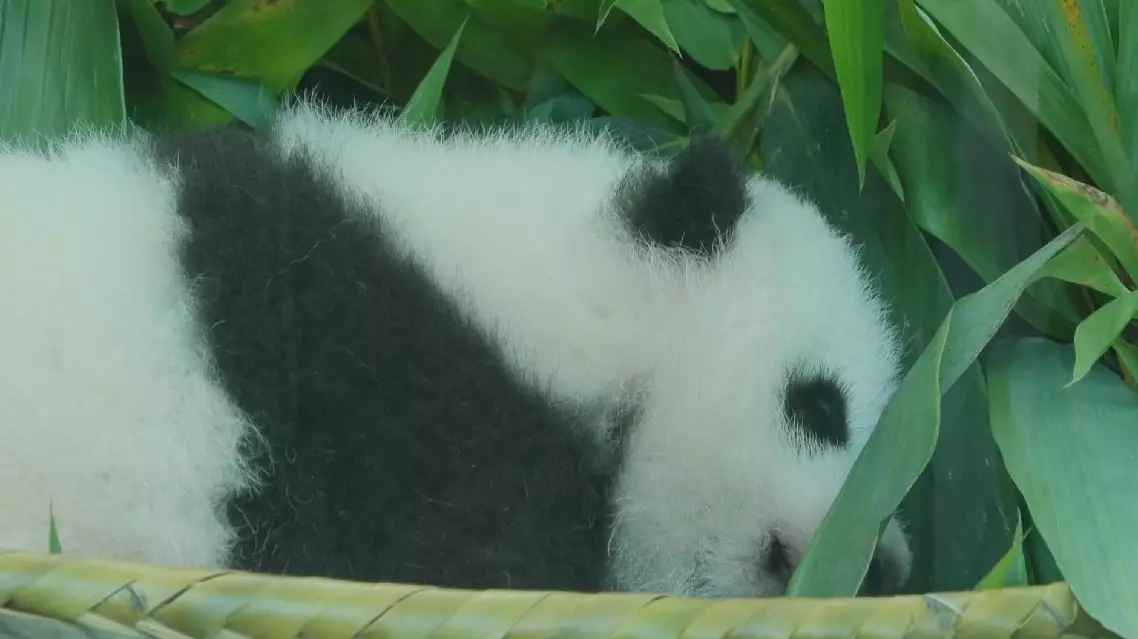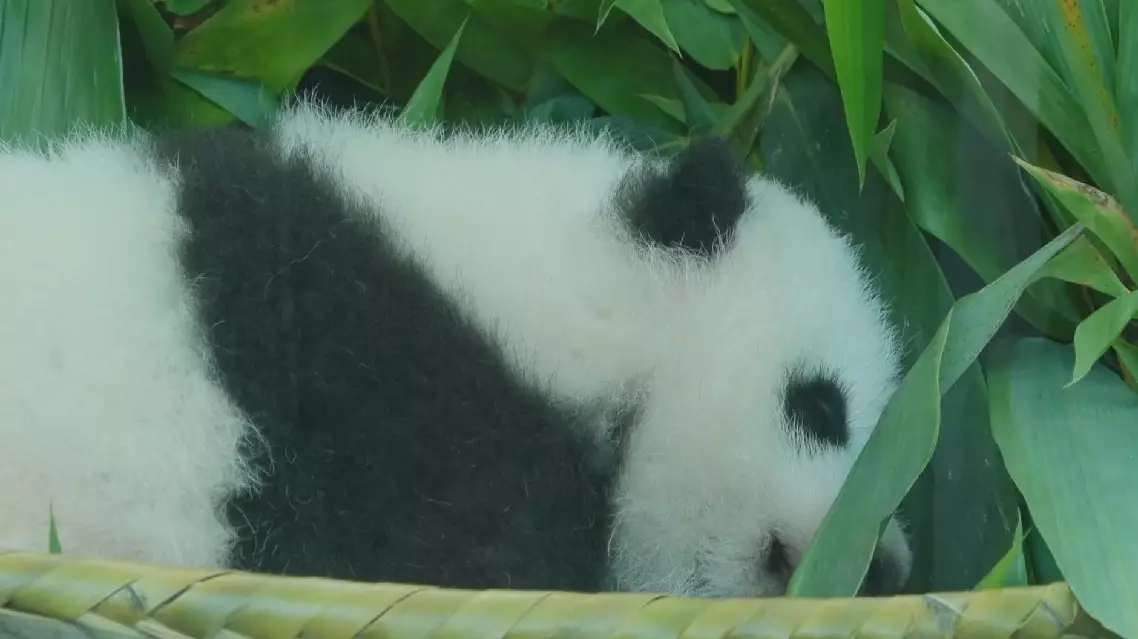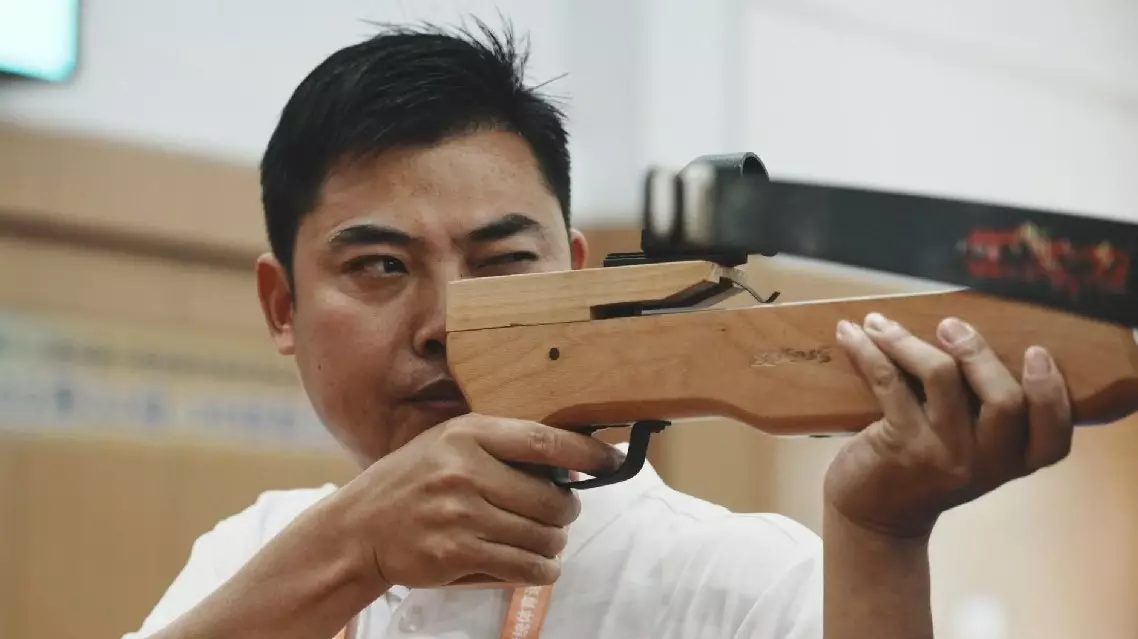To celebrate the upcoming Mid-Autumn Festival, Chimelong Safari Park in Guangzhou City of Guangdong Province, south China introduced to visitors baby panda Mei Zhu, the daughter of Meng Meng, the oldest sister of the world's only surviving panda triplets, and prepared a series of activities on Friday.
Mei Zhu, aged only 87 days, is in good health and just began teething. But the baby panda always gets a bit cranky after milk feedings, and requires panda keepers to spend around half an hour to calm her down.
"As a young panda, her digestive system is still developing, and excessive activity after feeding can lead to digestive issues. She is quite energetic now. If she found any strangers entering her enclosure and they wanted to, for example, pet her, she would be quite defensive, due to her self-protection instincts," said Chen Siming, a wildlife conservation expert.
Another star panda in the zoo, Guo Qing, also received his present, a pile of mooncake-shaped wowotou (a type of steamed corn bread). Guo Qing was of good appetite, which amused many of his fans.
"I am here just to see her. I drove 38 kilometers just to watch her mischief. She is very famous for that, always causing trouble when her keeper is not around," said a visitor.
The koalas are also welcoming guests. Totaling over 70 koalas in the park, more than 40 of them were presented to visitors by their keepers. The chubby animals constitute a big family of eight generations, with the youngest being 2 years old and the oldest reaching 19, much older than the average lifespan of the species.
"We've sent technicians to Australia to learn how to feed the Koalas, pick up veterinary and health care skills. With our valuable experience gained through years of raising the koalas, we are able to provide them good environment, food, and medical care. As a result, the average lifespan of the troop is getting longer," said a koala keeper.
In addition to these highlights, Chimelong Safari Park is also planning a series of animal enrichment events and sharing stories of the animals with the visitors during the Mid-Autumn Festival vacation.

Safari park in Guangzhou presents baby panda to celebrate Mid-Autumn Festival

Safari park in Guangzhou presents baby panda to celebrate Mid-Autumn Festival
Archers from southwest China's mountainous Guizhou Province won gold in the standard crossbow mixed team final on Monday at the ongoing 12th National Traditional Games of Ethnic Minorities of China.
The 12th National Traditional Games of Ethnic Minorities of China opened on Friday night in Sanya, a coastal city of south China's Hainan Province, featuring traditional sports such as crossbow shooting and dragon boat racing, and new additions like the debut of coconut tree climbing race.
In ancient times, people would use a crossbow to hunt and earn a living. It was also used as a weapon in war time and during battles. Fast forward to present day, and drawn by its blend of history and performance art, some people still enjoy it as a recreational sport, and crossbow shooting competitions are held worldwide.
In China, crossbow shooting is popular in the neighboring Yunnan, Guizhou, and Guangxi which lie in the southwest and south China, with the Miao and Yi ethnic minority groups known to be amongst the best. At the National Traditional Games of Ethnic Minorities, Liu Xingyu from Guizhou Province helped his team win the standard crossbow mixed team event, after getting nine points from his last shot to seal the win with an overall score of 191 points.
"I'm from the Miao ethnic group. We used to use the crossbow for hunting, but now we've just learned to use it for sporting events, and as a recreational sport," Liu said.
The crossbow resembles a bow and arrow but differs in its method of shooting.
"Shooting a crossbow is more like archery, except that it has a trigger like a rifle," Liu said.
This is Liu's third time competing at the National Traditional Games of Ethnic Minorities, and he said this sport is part of his homeland's ancient culture and it's important to carry forward this tradition through sporting events like this.
"Competing in this event promotes cultural and sporting exchanges among ethnic minorities. This is a great opportunity to further develop the traditional sports, also. So, I'm very happy to be a part of this for the third time, and I hope there are many more to come," he said.
This is Guizhou Province's second title in this sport, after Wang Renai won traditional crossbow men's standing position on Sunday.
The grand sports event, which will take place through Saturday, has brought together nearly 7,000 athletes, representing 35 delegations across China to compete in 18 sports and three demonstration sports, most of which were once unique to specific ethnic groups or regions.
Unlike traditional sporting events, the games feature competitions rooted in traditional customs and the daily life of people from different ethnic groups in China.
Beginning with less than 400 athletes from 13 ethnic groups, the event was first launched in 1953 with only eight sports. It's one of China's oldest national multisport games.

Archers from southwest China's mountainous Guizhou top standard crossbow mixed team podium











